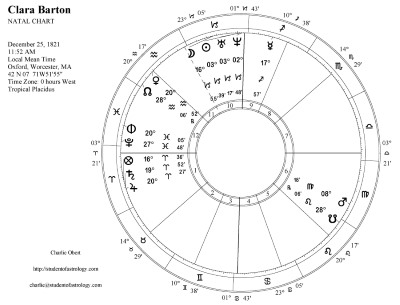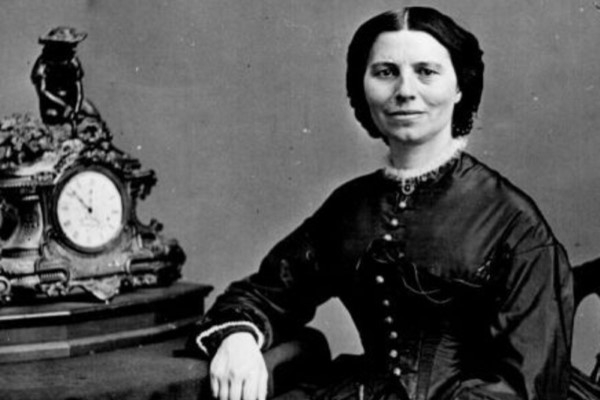By: Charles Obert
In this essay I want to demonstrate how the traditional system of essential dignities can be used to add quite a bit of detail and nuance to the interpretation of a chart.
Traditional astrology uses five different essential dignities. There are the major dignities, rulership and exaltation, and their corresponding debilities, detriment and fall. Modern astrology still has these dignities, although they are often not widely recognized or used.
In addition, there are three minor dignities, named triplicity, term and face. Each has a different meaning and different level of control.
For our example, I want to look at the chart of Clara Barton. She is most famous as the founder of the American Red Cross, and did extensive work in field hospitals during the Civil War. In addition to that, Clara Barton also did extensive work in public education, and also became a major spokesperson for the women’s suffrage movement.
Mars: the Lord of the Rising Sign
In Clara Barton’s chart (click on the chart at left to select a large image), I want to start with Mars, the Lord of her rising sign, Aries. In traditional astrology the Lord of the first house represents the person, and Mars is in the sixth house, which is associated with nursing – she was born a nurse, it is her identity and vocation. In addition, Mars in the 6th house is associated with the military – specifically, much of her nursing work was done during the Civil War on the battlefields.
Dignity by Triplicity
In this chart Mars has dignity by triplicity. Triplicity has to do with general support from the community, of the side you are on – you’re not running the show, but you are in the same party that is currently in power. So, Mars in triplicity is her working as a recognized team player with the army doing nursing on the battlefields. The soldiers she worked with recognized her as one of them, on their side.
Dignity by Term
Next I want to look at the dignity of term. Term is a low level dignity and has to do with how things are actually implemented. If the house ruler is company manager, then the term ruler is the field supervisor who is in charge of how the work gets done.
Mutual Reception
In Clara Barton’s chart, Mars and Venus have mutual reception by term – Mars is in the terms of Venus, and Venus is in the terms of Mars. Venus in this chart is in the 12th house, which is associated with self-sacrifice, and also with large institutions like hospitals and nursing homes. This plays out as nursing being a main area that Barton went in and accomplished a lot in implementing the field hospitals in the Civil War, and doing much of the nursing work herself. She is not ruler of the sign so she doesn’t run the show, but she does a lot at the more specific level of doing the actual work.
Saturn Rising
Now we need to look at Saturn, the rising planet in this chart. Saturn is in Aries, and in that sign Saturn is in fall, but also has dignity by triplicity. We already talked about a triplicity planet as being a recognized member of a team. A planet in fall is one that is not respected, not given credit, not listened to. I think of fall as the Rodney Dangerfield of dignities – a planet in fall don’t get no respect.
There is a repeating pattern in Clara Barton’s life. Repeatedly, she would go and build up a particular organization or form of service. When it became big and successful enough, the powers that be took the organization away from her and gave it to a man or community of men, often at much higher pay. That is a good example of Saturn in Fall – not being given credit, not being respected, not being listened to.
So the pattern is, Clara Barton goes in and does some really powerful work – building up a community school, or a field hospital – Mars in triplicity in 6th mutual reception by term with Venus in 12th – and then it is taken away from her and given to a man, without her being given a voice or given credit – Saturn in fall in the first.
However, there is another possible side to a planet in fall. A planet in fall can also express as a person who becomes an advocate or spokesperson for a community in fall, a group of people who are not respected or listened to, not given the dignity they deserve. In Clara Barton’s case, this expressed as her being a major spokesperson in the Women’s Suffrage movement, speaking for women who as a group were in fall – not respected, not listened to, with no power.
I could go much further, but I think you get the idea of how much detailed meaning you can get by really looking at the full system of essential dignities.




